Po Dikim Stepyam Zabaikalya (By the wild steppes of the Transbaikalia)
Po Dikim Stepyam Zabaikalya (By the wild steppes of the Transbaikalia)
The song “Po Dikim Stepyam Zabaikalya” was composed by convicts in Siberia. Siberia is an extensive geographical region, by the broadest definition is also known as North Asia. Siberia has been historically part of Russia since the 17th century. The territory of Siberia extends eastwards from the Ural Mountains to the watershed between the Pacific and Arctic drainage basins. Transbaikalia, or Dauria is a mountainous region to the east of or "beyond" Lake Baikal in Russia. Dauria, is derived from the ethnonym of the Daur people. It stretches for almost 1,000 km from north to south from the Patomskoye Plateau and North Baikal Plateau to the Russian border. The Transbaikal region covers more than 1,000 km from west to east from Baikal to the meridian of the confluence of the Shilka and Argun Rivers.
Po Dikim Stepyam Zabaikalya (Brodyaga)
“Po Dikim Stepyam Zabaikalya” is a Russian folk song. The song was known since 1880s, when it appeared and proliferated among prisoners of Siberian penitentiaries. In 1908 it was published under the title of "Brodyaga" (The Tramp), by the Swedish composer Wilhelm Harteveld, who had collected it in 1906, during a trip to Siberia.
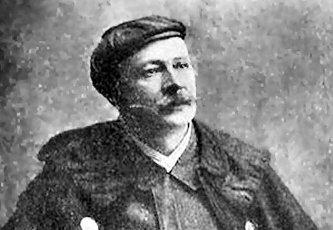
Wilhelm Harteveld
The words author was printed to be I. K. Kondratiev, an expert on songs and a Russian Empire writer, who published several studies on Russian songs. There are few data about his biography. Ivan Belousov states that Kondratyev was a member of Vasily Surikov’s circle. Both Belousov and Korney Chukovsky were highly critical of Kondratyev’s work. Kondratyev wrote a novel Saltychikha, stories, plays, poetry, translations. He also wrote the lyrics for the best known of these being “Charming Eyes.” He is also credited with the lyrics of the song “On the wild steppes of Transbaikalya”. His authorship can't be proven though, because the poem is not included in his last published volume of poems "Under the noise of the Oak Groves" (1898).
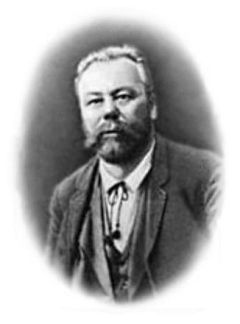
I. K. Kondratiev
Siberia is and was rich in its nature and its natural resources. But the temperatures that can reach in winters to -60°C made the living conditions almost unbearable. The first Russian prison camp in Siberia arose at the end of the 17th century as the two double tsars, Ivan V and Peter I who reigned between 1682 en 1696, made a proclamation in which was captured that some death sentences could be put into community service. This prison labour would take place in a so-called Katorga, a remote penal camp with minimum facilities. Over the next 130 years about 1.2 million prisoners were sent to Siberia, where they were put to work in the mining, but also in agriculture, because during summers the temperature in Siberia can raise up to +30°C, or in logging. Others were required to help with the construction of new infrastructure, including the 2000 km-long Amur Cart Road and the Trans-Siberian Railway.
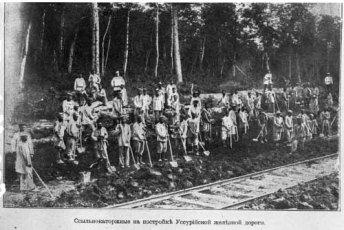
Prisoners builiding the Ussuri Railroad
A large percentage of the political prisoners tried to escape from the camps. It was very hard to catch a runaway, but the chances were also real that the escaped prisoner would be drowned in the river, or frozen to death in the primeval forests. The passionate craving for freedom has been well described by Dostoyevski. “At the first song of the lark throughout all Siberia and Russia, men set out on the tramp; God’s creatures, if they can break their prison and escape into the woods.... They go vagabondising where they please, wherever life seems to them most agreeable and easy; they drink and eat what they can find; at night they sleep undisturbed and without a care in the woods or in a field;... saying good night only to the stars…”
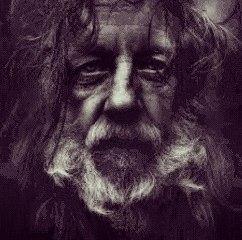
Brodyaga (Vagabond)
“Po dikim stepyam Zabaikalya” (Russian: По диким степям Забайкалья) also known as “Brodyaga” (Russian: Бродяга) says about an escaped prisoner, who crosses the Baikal and meets his family. The song was recorded at the beginning of the 20th century by Nadezhda Plevizkaya and Semion Sadovnikov. A recording of this song performed by Peter Leshchenko was published in 1940s in Bucharest. In 1946 the Soviet songstress Lidia Ruslanova recorded the song. It was also been performed by the Piatnizkiy Choir. The Polish singer Czesław Niemen included the song in his Russian album in 1973. Zhanna Bichevskaya recorded the song for her album in 1980.
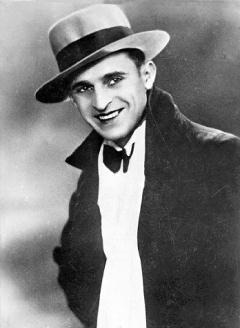
Peter Leshchenko
The song remains in the repertoire of various Russian artists. There are several versions, which differ slightly in words or expressions. Most musicians omit some verses. The following is the most common version. (The verses in italics are those most often omitted):
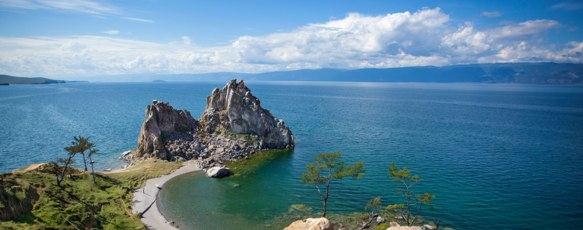
Lake Baikal
По диким степям Забайкалья (Russian lyrics)
1 По диким степям Забайкалья, Где золото роют в горах, Бродяга, судьбу проклиная, Тащился с сумой на плечах. 2 Идёт он густою тайгою, Где пташки одни лишь поют, Котел его сбоку тревожит, Сухие коты ноги бьют. 3 На нем рубашонка худая, И множество разных заплат, Шапчонка на нем арестанта И серый тюремный халат. 4 Бежал из тюрьмы тёмной ночью, В тюрьме он за правду страдал. Идти дальше нет уже мочи – Пред ним расстилался Байкал. 5 Бродяга к Байкалу подходит, Рыбацкую лодку берёт И грустную песню заводит, Про Родину что-то поёт. 6 "Оставил жену молодую И малых оставил детей, Теперь я иду наудачу, Бог знает, увижусь ли с ней!" 7 Бродяга Байкал переехал, Навстречу - родимая мать. "Ах, здравствуй, ах, здравствуй, мамаша, Здоров ли отец мой да брат?" 8 "Отец твой давно уж в могиле, Землею сырою лежит, А брат твой давно уж в Сибири, Давно кандалами гремит". 9 "Пойдём же, пойдём, мой сыночек, Пойдём же в курень наш родной, Жена там по мужу скучает, И плачут детишки гурьбой".
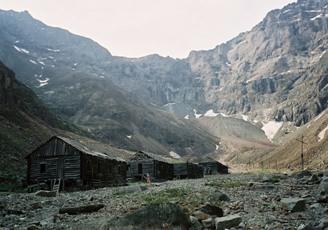
Zabaikayle, Uranium Mine
Transliteration
1 Po dikim stepyam Zabaikalya, Gde zoloto royut v gorakh, Brodyaga, sudbu proklinaya, Tashilsya s sumoi na plechakh. 2 Idyot on gustoyu taigoyu, Gde ptashki odni lish poyut, Kotel ego sboku trevozhit, Sukhie koty nogi byut 3 Na niom rubashonka khudaya, I mnozhestvo rasnykh zaplat, Shapchonka na nem arestsanta И seryi tyuremnyi khalat. 4 Bezhal iz tyurmy tyomnoi nochyu, V tyurme on za pravdu stradal. Idti dalshe net uzhe mochi – Pred nim rasstilalsya Baikal. 5 Brodyaga k Baikalu podkhodit, Rybatzkuyu lodky beryot I grustnuyu pesnyu zavodit Pro Rodinu chto-to poyot. 6 "Оstavil zhenu moloduyu I malykh ostavil detei, Teper ya idu naudachu, Bog znayet, uvizhus li s nei!" 7 Brodyaga Baikal pereyekhal, Navstrechu - rodimaya mat. "Аkh, zdravstvuy, аkh zdravstvuy, mamasha, Zdorov li otets moi i brat?" 8 "Otets tvoi davno uzh v mogile Zemlioyu syroyu lezhit А brat tvoi davno uzh v Sibiri, Davno kandalami gremit". 9 "Poidyom zhe, poidyom, moi synochek Poidyom zhe kuren nash rodnoi Zhena tam po muzhu skuchayet, Plachut detishki gurboi".
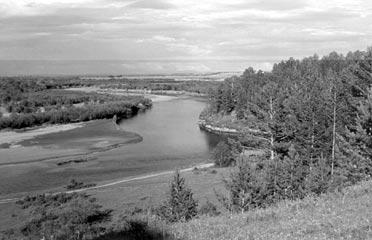
Zabaikayle
By the wild steppes of the Transbaikalia (English lyrics)
1 On the wild steppes of Transbaikalia, Where people dig for gold in the mountains, A vagrant, bemoaning his fate, Is wandering with a bag on his back. 2 He walks through the thick taiga, Where only a few birds sing, He carries a tin can on his side, His feet are strapped in dry skins. 3 He wears a worn-out shirt And a lot of different patches. The cap on his head is a convict’s cap And he wears a grey convict’s uniform. 4 He escaped from prison during a dark night Where he was imprisoned for defending the truth. But he could not go any further In front of him was Lake Baikal. 5 The vagrant walks to the shore And climbs in to a fisherman's boat. He starts to sing a sad song Telling something about his native land. 6 "I left my wife when she was young And left her with my small children, Now I wander aimlessly, God knows, whether I shall meet her again!" 7 He crosses the lake, His mother comes to meet him. ”O my dear mother let me embrace you, Are my father and my brother well?” 8 "Your father has been dead for a long time; He now rests in the damp earth. And your brother is serving his sentence, Wearing chains, somewhere in Siberia." 9 "Let's go, let’s go, my son, Let's go home to our house, Where your wife misses her husband, And all your little children are crying."
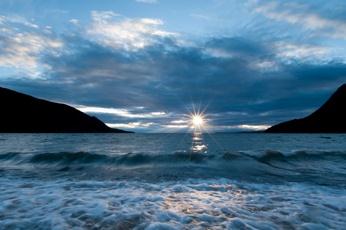
Lake Baikal
Лидия Русланова По диким степям Забайкалья
Lidia Ruslanova – Po dikim stepyam Zabailayla
Last Updated (Friday, 21 April 2017 15:49)








